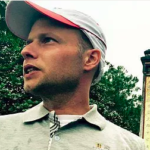
The Bloggers Digest periodically features interviews with some of the interesting people behind the blogs we love.
FIRECracker and Wanderer weren’t always this carefree. The retired millennial couple may be globe-trotting and meeting new friends daily now, but they used to share the same stresses and pains that millions of their peers face today.
Soaring cost of living? Check. Skyrocketing student loan and other debts? Check. Full-time jobs that feel limiting at best and suffocating at worst? Check and checkmate.
At 31, the two (FIRECracker and Wanderer are their public nicknames) took the frightening leap and retired to travel the world. Eyebrows raised. Some friends and family members offered stern warnings and words of concern. Stepping outside of the familiar mortgage-and-job template they had been shown most of their lives was viewed by some as far too risky, an impetuous choice made by two frustrated 30-somethings who would surely “get over it” in time.
As the two grew increasingly dissatisfied with day-to-day living as our parents espoused it, they turned their attention to the FIRE movement, which in recent years has been spreading as fast as its acronym name would suggest. But they didn’t merely make a reckless choice to “up and travel the world”; rather, they made a surprisingly mature and calculated plan to do so.
FIRE – or Financial Independence Retire Early – is a movement that has caught the attention of millennials across the globe. Millennials like FIRECracker and Wanderer, who grew increasingly frustrated by the financial deck of cards seemingly stacked against them.
Since their adventures began, FIRECracker and Wanderer have been writing the wildly popular blog Millennial Revolution, which delivers this simple yet powerful premise: Stop working. Start Living. The blog chronicles their own journeys across the four corners of the world, while also offering tips for others who may be interested in joining the movement.
Because while it may be wildly tempting to give notice to your employer and jump ship from your 9-5 (or 8-6, or 7-9, or two to three jobs just to make ends meet), the blog’s authors are well aware of the anxiety involved in such a leap. As such, they help their fellow retirees to set up their own safety nets – a financial foundation on which to leverage their futures. Instead of offering a get rich quick scam, they work to help others in strategically fortifying their wealth.
As FIRECracker writes on her blog:
Investing is scary for most people, because it’s a MINEFIELD of slick-haired, Gordon Gecko types, trying to steal your money. We met these very same people, trying to sell us shitty mutual funds with 2%+ MERs and ponzi-scheme-like investments, promising 20% returns back in 2008.
Instead, FIRECracker, Wanderer, and those within the movement teach “Financial Education,” which they believe should be a right, rather than the privilege it has morphed into. They offer guidance for nearly every type of early retiree, from those with kids to those who are not already wealthy, to those who do not even have health insurance.
We caught up (electronically, since, you know, she’s out travelling the world and all) with FIRECracker, who gladly answered our questions. If her answers spark your curiosity, visit millennial-revolution.com and see whether that spark might just be fanned into a flame.
Q & A with FIRECracker
David Lacy: For some of our readers who may not know what FIRE stands for, or what the FIRE movement is all about, could you explain the acronym and its origin?
FIRECracker: FIRE stands for Financial Independence Retire Early. Financial independence is the idea that if you build a portfolio big enough, you can safely withdraw 4% each year to cover your expenses, and as a result, you no longer need to work. This originated from the Trinity study, where a group of researchers simulated what an individual’s portfolio would look like as he retired each year during the entire history of the stock market, using various withdrawal rates. They found that a 4% SWR (Safe Withdrawal Rate) gives a success rate of 95%, preserving the portfolio value at the end of 30 years.
DL: Walk me through an average day in the life of Miss Firecracker– or is there no such thing as a typical day?
FC: It varies. Some days I’m sightseeing. Others I’m meeting with friends from various corners of the globe. And some days I’m writing the blog, answering comments, and working on a book for Penguin Random House. My favourite thing about early retirement is that I get to choose what each day looks like.
DL: I love that you look beyond the accusations of entitlement so commonly hurled at millennials, and instead explain the actual causes of this generation’s economic woes. While we certainly agree that your economic and lifestyle arrangement are ideal, should society itself also be working to change the underlying economic structure in any major ways?
FC: Financial independence is about personal responsibility. While I can’t predict the direction economic shifts or societal changes in the future, I do believe that as technology improves, automation will replace more and more manual labour. As a result, we can no longer rely on companies to take care of us. We have to take care of ourselves. That’s why financial freedom is so important. Since you have no control over how the economy changes over time, having a handle over your finances makes you less vulnerable to layoffs and unexpected job changes.
DL: You’ve ditched the 9-5 and built for yourself a rewarding life centered on experiences and relationships. While undoubtedly this is ideal, what are some of the challenges you face?
FC: When I first retired, losing an identity we’d built up over a decade was pretty scary. But over time, that fear has dissipated, since I’ve built a newer, better identity. I was also worried about losing my community since we become nomadic. Sometimes we do miss our friends and family, but the new friends and community we’ve gained with travel makes the tradeoff worth it. We also keep in touch with our friends/family via Skype, Social media, and Whatsapp.
DL: What’s the one place out of your adventures that you would want to revisit again and again, and what about it makes it so special?
FC: Chiang Mai, Thailand. It feels like home to me. The warmth of the people, the food, the relaxed pace of life – everything about Thailand makes you want to stay. It also helps that you can get $12 daily massages and live like a queen on $25,000 USD/year per couple.
DL: High-profile bloggers like yourself have their own type of celebrity status. Have you been recognized in public before? In what ways do your fans interact with you?
FC: A surprising number of times– which is weird, because I don’t think of myself as a celebrity. I’m just an ordinary person, I didn’t cure cancer or save the world. For some reason, we’ve been recognized in the middle of the ocean in the Galapagos at 6am in the morning, at Times Square in New York, and in Iceland recently. One reader wanted to take a selfie with us. I was like “what? seriously? Why?” Talking with readers in real life is always fun – though also weird because I’m always shocked they want to talk to me.
DL:It appears from the outside that the FIRE movement is not merely a collective of random folks blogging about money and early retirement, but that it’s actually a rather close-knit community of bloggers who somewhat know each other and sometimes even get together outside of FinCon. I’m curious how you would characterize the community.
FC: I love the FIRE community. Every time I meet someone from there, we always end up talking for hours, even though we started off as strangers. I think the reason why this community is so close-knit because everyone just “gets” each other. We don’t have to explain our obsession with SWRs, or defend our life choices, or be forced to buy shit we don’t need to impress people we don’t care about. You get an instant connection because it’s so rare to find people who accept you for you and don’t consider you a weirdo for not following the herd.
DL: Tell me more about your upcoming book and what readers can expect from reading it?
FC: Our book is called “Quit Like a Millionaire” and it will teach you how to use investing, savings, tax minimization, and geographic arbitrage to achieve what we’ve achieved – namely retire to travel the world in our 30s. It follows my journey from growing up poor, to becoming middle class, to getting rich. Since I grew up poor in rural China, I will show you that even if you started off at the bottom 1% of the world, you can still reach the top 1% by learning the strategies we used to become rich.
DL: How have you seen Millennial Revolution evolve from when you first conceived it, and what are you most of proud of about your blog?
FC: The success of MR can be attributed to our wonderful community of readers. When I first started it, it was just a rant about housing costs and how the rules our parents taught us about achieving financial success no longer apply. But over time, through reader cases and interactions with commenters, our blog has evolved to include topics about investing, travel, early retirement, healthcare costs – and anything the readers want to know that will help them achieve financial independence. We’ve learned a lot from listening to their challenges and struggles and they’ve taught us a lot. I guess I would say I’m most proud of how far it’s come in just 2 years. Currently, we have around 160-180K page views a month and nearly 4 million page views to date. I never thought we’d come this far in this short time frame.
DL: What single piece of advice would you offer to a reluctant millennial, excited but fearful to take that novel plunge?
FC: Start investing as early as possible. Since you are young, you have a long time horizon, which will allow the power of compounding to work in your favour. Don’t work hard, work smart. Let your money do the heavy lifting.
Thanks Millenial Revolution, for offering us into a glimpse of what our future could be like as an early retired globe-trotter! For more interviews with bloggers, click here.



Be the first to comment